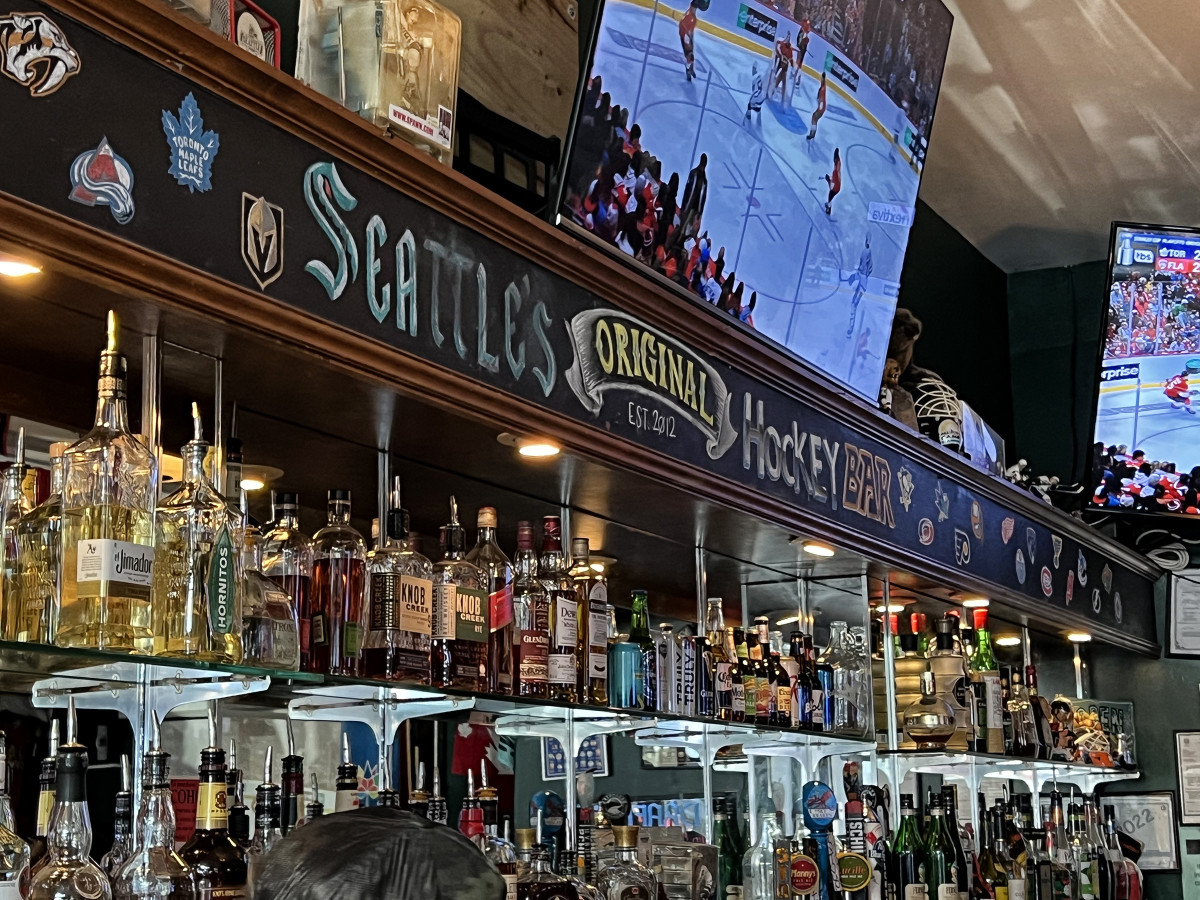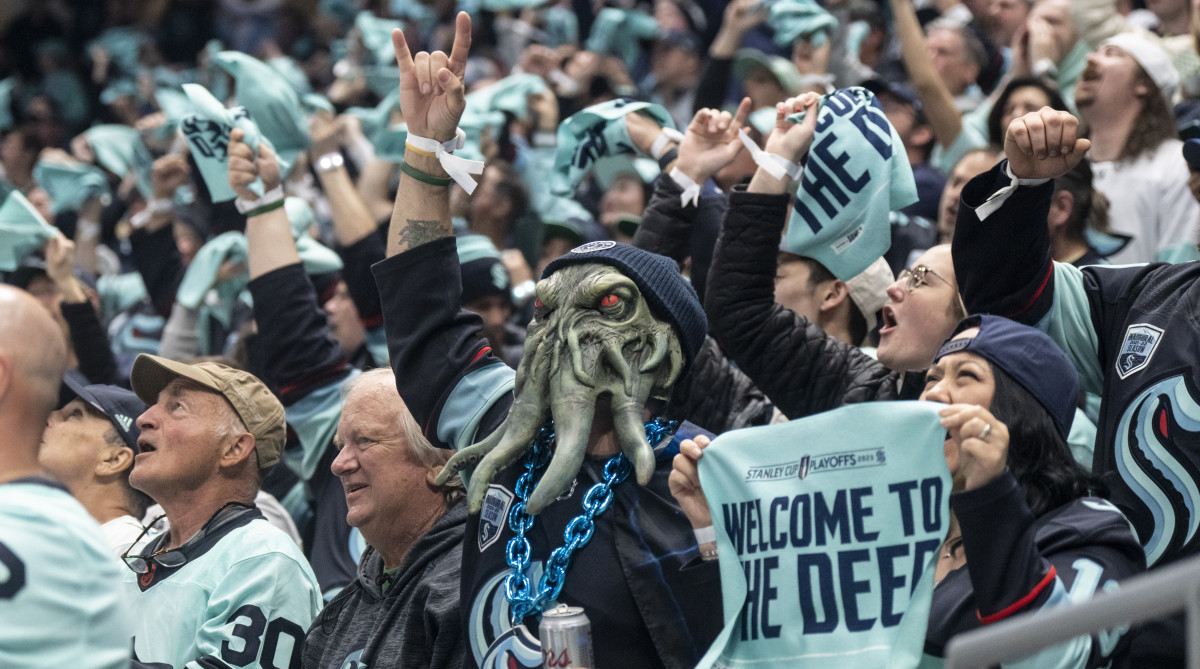With the Winter Classic in Town, Seattle’s First Hockey Bar Is Struggling to Stay Open

Lemme tell you about my buddy, Tim. He’s Canadian-Canadian, synonymous for kind. Loves animals. Adores hockey. And he owns Seattle’s first-ever hockey bar, in what I’d argue is Seattle’s last true neighborhood that still vibes the way the entire city once did.
I first wrote about Tim Pipes and his bar, The Angry Beaver, last May, while getting swept up in Seattle Kraken mania like the rest of the locals. I covered one game from atop a barstool, writing about the electric scene and hockey fever in a football city. But I was drawn more to Tim, his life and story and country song existence the past few years. He started the bar for the right reasons, because he wanted to find a watering hole where he could catch games played by his beloved Maple Leafs. His bar tethered many disparate souls to the game he loved. He filled every inch of every wall with memorabilia, until experiencing The Angry Beaver felt like going to a hockey museum, only with Caesar Bloody Mary’s and poutine flights and screens all over the place showing games.

That’s also when the trouble started. The gas explosion across the street that sounded like a terrorist attack and ripped apart the bar’s insides. The divorce. The robbery that happened while Pipes was fighting back toward a re-open. The deaths of both parents. The global pandemic, rising rents, an aging but beloved dog who helped him through everything else, along with his own health issues.
Two things were obvious that first day: We weren’t done learning about each other and what I expected driving over to The Angry Beaver wasn’t true; this wasn’t exactly a heartwarming story of the hockey fan who helped imprint hockey in Seattle long before the NHL arrived. This was the story of a man who dared to dream, succeeded beyond reasonable expectation and still had the right to feel “cursed.” That he not only understood that, but kept all of the dozens of emotions he felt hourly in their proper compartments, led to only one conclusion: These Pipes were made of steel. The storm that landed overhead and never stopped pouring was largely outside of his control. That didn’t change the dream, nor dent what he had achieved.
But a healthy, flexible mindset, combined with a deep love of hockey, can only take a human being so far. Hence another column on the owner of Seattle’s first and best hockey bar. It only exists in a public forum because, well, Tim Pipes needs some help. He didn’t want me to write this story. He needed to be coaxed into discussing his predicament. He realizes he has been fortunate, in some ways; that he’s not owed anything; that plenty are struggling, with businesses and mortgages and health issues and everything else.
See, an NHL showcase arrived in town this week. The Winter Classic features special jerseys designed for the occasion, fan festivals, mascot skates, watch parties, long-shot contests, fundraisers and fan villages; everything culminates Sunday with a hockey game held outdoors inside a baseball park. But the very elements that made Seattle attractive to America’s largest professional hockey league have also conspired to turn Pipes’s dream into a pipe dream. This might be the Emerald City, but for every new gleaming tower of condominiums or every new professional sports franchise, neighborhoods like Greenwood, home to The Angry Beaver and dozens of other establishments, lose another piece of their soul—or pay more to retain what they’ll eventually lose anyway.
Sometimes, Pipes looks at pictures on his phone. The ones of his bar, filled to capacity, jam-packed with hockey fans. Those days, it seems, are over, at least until the Kraken’s next playoff run, which appears unlikely to happen later this season. He doesn’t blame the team; he doesn’t blame anyone, really. But even in a scenario without an obvious villain, his issues continue to mount. He can only shake his head and whisper things like, “This bar has been nothing but heartache and pain.”
To wit: Rent continues to rise and, after the gas leak explosion and the pandemic, the landlord is finished with cutting any tenants' breaks. Bills continue stacking up, leading to months where Pipes wondered if he could pay his employees’ their full salaries (so far, he has). He received a handful of small grants during the pandemic, but the last came in June, for $2,000 and no more appear imminent.
Within that conundrum, he cannot—and has not—paid himself anything for years. He jokingly refers to The Angry Beaver as a non-profit—and the joke hits a little close to home. He covers his personal expenses through what money he received from his mother’s estate. But that won’t last forever. The attention he and the Beav received during last spring’s playoff run hasn’t led to bigger, consistent crowds. The opposite is happening and growing worse each week. His own health continues to decline. He can’t sleep. He may have cancer. His dog continues to age. Worse yet, one of his employees died by suicide recently—but not before sending Pipes a cruel missive explaining the employee’s plan.
How can any small business in greater Seattle survive this environment, let alone thrive within it? If something doesn’t change, Pipes will be forced to close—and with little to show for his vast efforts beyond a dream realized that netted less than zero profit. His doctor asked him the other day to remember the definition of insanity. He didn’t need to think about it. He has lived it, for years.
Meanwhile, as a Puget Sound native and longtime greater-Seattle resident, I’d argue that every time a place like The Angry Beaver shutters, the city loses another slice of what made it so distinct and such a desirable place to live. Seattle is stuffed with structures; fancy walking bridges, a sphere, office towers standing sentry all over downtown, housing on top of housing on top of housing.

Take a look beneath the Pleasantville-like exterior. Why can’t some of the unending cash infusion go toward helping the homeless population, rather than shifting around their makeshift tent cities? Why can’t small businesses like Pipes’s business receive critical and necessary backing in order to continue to survive?
The Seattle long-timers and old-timers remember loud concerts at small venues … hot pot and pho and fresh sushi and spaghetti and oysters from nearby farms, everything local, everyone welcome … the city, overall, affordable to more than just tech executives in town to hike and ski and patronize fancy restaurants, while churning out revenue that goes to corporations. Seattle had an edge that separated it from other major cities. It doesn’t anymore. That edge has been wiped out by every Amazon, Google or Microsoft campus, by a bevy of millionaires and a large number of billionaires, many of whom give generously to causes but not the ones closest to home, the ones that made Seattle what it was but is not likely to be again.
Maybe one of them loves hockey. Maybe the hockey lover in the B club wouldn’t mind extending the season of giving toward a hockey bar that deserves a break. Maybe the Kraken would take over, to keep the lifeblood of the sport in Seattle flowing, to invite prospects and free agents for dinners that feel more like home; to highlight hockey history, in a place where it’s already slapped all over the walls.
Pipes doesn’t want a bailout. He wants to keep a dream, this dream of his, alive. He wants children to swing by for dinner and realize that hockey fans exist, that the NHL exists.
So, yeah, the Winter Classic. To be crystal, I think it’s great. I have tickets. I’m planning to go to more than one event. But rather than attempt to build more of a hockey base with even more corporatization, why not do the same thing and retain a small sliver of the city’s soul? With the former, the same winners just win more. With the latter, everybody wins.
Right?
